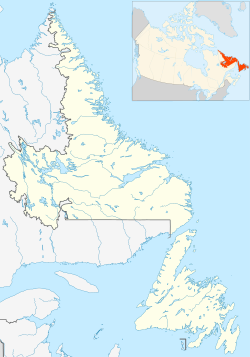Burlington, Newfoundland and Labrador
| Burlington | |
|---|---|
| Town | |
| Location in Newfoundland and Labrador | |
| Coordinates: 49°45′01″N 56°01′03″W / 49.75028°N 56.01750°WCoordinates: 49°45′01″N 56°01′03″W / 49.75028°N 56.01750°W | |
| Country | Canada |
| Province | Newfoundland and Labrador |
| Area | |
| • Total | 4.11 km2 (1.59 sq mi) |
| Elevation | 3 m (10 ft) |
| Population (2011) | |
| • Total | 349 |
| • Density | 85/km2 (220/sq mi) |
| Time zone | Newfoundland Time (UTC-3:30) |
| • Summer (DST) | Newfoundland Time (UTC-2:30) |
| Postal Code | A0K 1S0 |
| Area code(s) | Area code 709 |
| Website | www |
Burlington is an incorporated town in Newfoundland and Labrador, Canada. It is a small fishing and lumbering community on Highway 413 at the north side of the mouth of Green Bay.
Burlington was once named Northwest Arm, and was permanently settled in the mid-19th century. The community was renamed in the early part of 1915 due to a mix-up in the mail service. After many residents complained that their mail was sent to another community with a similar name, the town leaders felt the need to have a name change. Out of three separate entries, 'Burlington' was chosen.
There was no large industry in the 19th century. The early settlers fished for cod and cleared land to grow potatoes, cabbage and small fruits. Keeping animals provided meat for the winter and milk and butter in season. Settlers built their own boats for fishing in Labrador, or they were employed by the inshore fishery. When mines opened at Bett's Cove and at Tilt Cove some of the men went there to work.
Logging pitprops for the United Kingdom were started in 1915 by John Jennings (contractor). This industry was closed in 1918 when the sale of pitprops ended. Lumber camps opened in 1920 but closed during the Depression of the 1930s. In 1935 the Thistle family started cutting export wood. They remained a major economic force in Burlington for approx. 30 years. Camps later opened for the cutting of pulpwood and continued for about ten years. In 1969 pulpwood was again the main industry, shipped out by truck from Burlington.
Burlington and surrounding area has a distinct dialect that is still heard by many today, because of its English and Irish heritage.
...
Wikipedia

